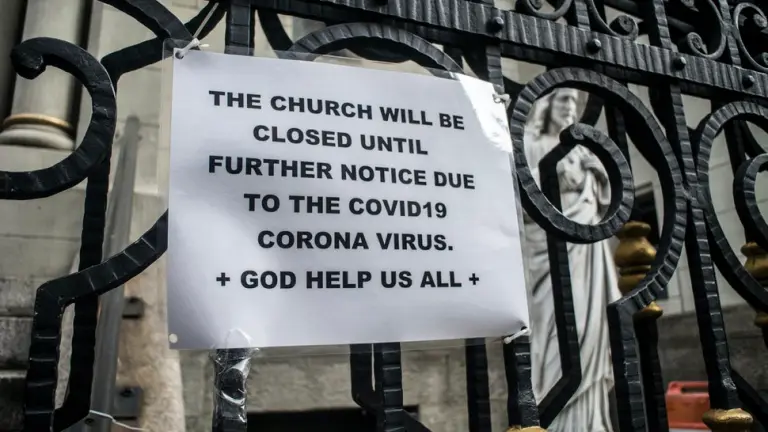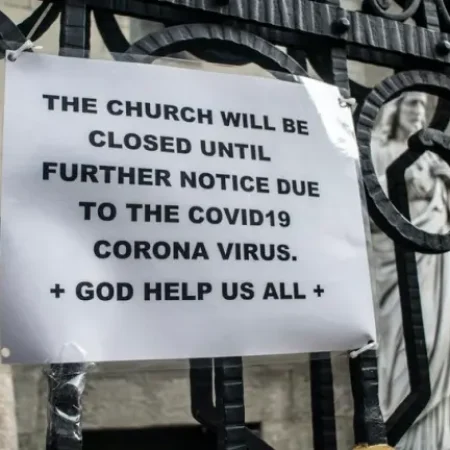
I have been reading the edited text of a four-part series of sermons on ‘why we can’t not worship’ by Matthew Roberts, Minister of Trinity Church York, which is part of the International Presbyterian Church, and who is a former moderator of the British Presbytery of the IPC. The first one I read, and which I am quoting from, was written before, but preached after, the second covid lockdown had been announced on 31st October. You can find the texts here, here, here and here.
Matthew argues very cogently and biblically for why the government ban on churches meeting together was an edict that should have been resisted and disobeyed by congregations, as numerous did. I commend the four posts to you, but was drawn to these excerpts:
The Church is the assembly of the Lord Jesus Christ. That is what the word means. When William Tyndale translated the Bible into English in the sixteenth century, a work to which he devoted his life and for which he eventually lost it, one of his most inflammatory decisions was his translation of the word ekklesia, ‘church’. He quite rightly had noticed that it means ‘assembly’ or ‘gathering’. So he translated Jesus’ famous words as “apon this rocke I wyll bylde my congregacion. And the gates of hell shall not prevayle ageynst it.”
Jesus said he would build an assembly, a gathering, a congregation of people. Now people congregate for all sorts of reasons: to celebrate, to plan, to make decisions, to declare, to protest and present petitions, to hear and learn, even to fight and to riot (the word ekklesia is used in Acts 19 to mean both a riot and a lawcourt). Jesus’ assembly will do all of these things and more: it will be a world-conquering, a hell-raiding assembly, one which will rout the forces of evil, deliver people from its captivity and sentence, and usher in a whole new world. Human governments tremble at the thought of some human gatherings – that is how revolutions begin – but the devil himself will cower before this one.
Roberts is, of course, completely right, as was Tyndale and, were the situation arise again I would certainly not comply with what I consider to be unwarranted and unjustified intrusion into the life of the church by the State. That view was, of course, upheld by the Scottish Court in March 2021, and so the situation should never arise again.
The court stated that the Scottish Government , “did not have the constitutional power to restrict the right to worship in Scotland and that the closure was an infringement on the human rights of Christians in Scotland.”
Did I comply back in 2020? Yes, regrettably and with hindsight. Well, you might say, it’s easy now to take a bold stand when it is unlikely ever to recur. There is some truth in that but March 202 was a unique time for me. The lockdown and closure of the churches which I, as a serving Pastor, complied with, came right on the back of one of the most testing times of my entire life when my ministry, and I personally, had been baselessly attacked and I was on the verge of a nervous breakdown. Mercifully, that never happened, but emotionally I was in no place to take such a stand and, paradoxically, the following weeks of enforced distance actually were used of the Lord to restore me.
Nonetheless, I do think we need to revisit such passages as the oft quoted Romans 13 and consider whether our understanding of it has usually been too simplistic and narrow. In the increasingly hostile work in which true biblical Christians and churches operate today, a covid lockdown may not happen again but who know what other attack might be just around the corner.
Roberts also address the issue of what has become almost the norm for so many professing believers – watching a service from home.
Does this mean that we can’t watch worship online? Of course not. We can certainly do that, and it is a very good thing to do. We can genuinely worship God ourselves, or with our families and households, while we do so. But nevertheless, it is not church. It is not gathering. It is not the thing we are made for, not a taste on earth of our eternal destiny in heaven. So for those who cannot, for good reason, come to gather with the church for worship, watching online is an excellent thing to do. But it should be seen as an excellent thing which mercifully relieves, but does not take away, the real grief and loss at not being able to gather in person.
Again, watching church online is good. God no doubt uses it for great good in the lives of those who cannot come to meet with the church. But there is nevertheless a real loss, for God has promised to bless the assembly of the saints in the way he has not promised to bless merely watching it at a distance. We should do all we can to be present there if we want to receive what God has promised….Why can we not stay apart? Because gathering to worship God is what we are made for; and gathering to worship God is the greatest blessing there is on earth. We will not stay apart, for Christ has made us one body.
In the decision of the Scottish court I referred to above, the Judge also made this statement, referring to online services:
“These are best viewed as an alternative to worship, rather than worship itself. While certain church practices -the reading of prayer, preaching and teaching -may be observed, or even, in the case of live streaming, participated in to a certain extent, on a computer screen or a television whilst alone, in the solitude of one’s own home, that does not amount to collective worship…..That might be an alternative to worship but it is not worship. At very best for the respondents, in modern parlance, it is worship-lite.”
What strikes me about that judicial statement is that this non-Christian (as far as I know) Judge understands the nature of true Christian worship better than many Christians and Christian leaders. For me, one of the most disturbing aspects of recent months has been to hear and read of so many Christians and Christian leaders who say that they are happy to live with the current state of affairs as long as is deemed necessary and that we can worship just as well from our living room as in a church building.
Yes, you can worship individually but you can’t worship collectively and the regular collective worship of true believers is something explicitly taught in Scripture and essential to our spiritual wellbeing. If you can survive without it there is surely something wrong with your spiritual life, my friend.
Let me state that I am fully aware that this is a contentious issue, even among genuine believers and church leaders, and I have no wish to fall out with, judge or, in any way, disrespect those who come to a different conclusion; just as I trust they would not fall out with, judge or, in any way, disrespect me.
